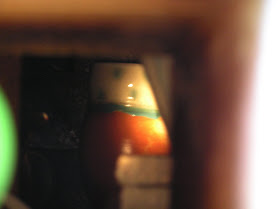
I have a confession to make. (Well, not a "confession;" it's nothing awful, but I am a little embarrassed about it.)It requires a preface:
From 1994-2000, I was a full-time potter. I taught classes through the Bloomington Art Center and the
Northern Clay Center, but I did and do consider teaching an important part of being a potter, for me; it keeps me fresh in a host of ways. In 2000, my first marriage ended after a long and painful struggle, and I moved back to Maine. I got an office gig to stay afloat while I figured things out. I always thought it would be temporary, and it was.
Here's the confession part: I quit that job in 2001, to be a full-time potter again...and I failed.
I failed due to lack of discipline. I had some money from the sale of my home in St. Paul, and it allowed me to just sort of noodle around, making pots here and there, but mostly drinking, eating out, boating, dating, hiking and biking, and just generally not working. Or at least, not doing the un-fun parts of self-employment: planning, budgeting, and selling. Because I didn't need to sell pots, I didn't try; my inventory built up, and there's nothing that discourages production like over-full shelves.
That was all fun, and I told myself I deserved it, as I had earned the money fixing up that St. Paul house. I almost can't say I regret it, as it was a healing time. But.
By 2002, I had just enough money left for a (small) downpayment on another house, so I pulled the plug and got another office gig, and I have had one ever since, until now. I am determined not to do that again.
Not that I expect to be tempted; the money now is totally hand-to-mouth, so the temptation to fritter away time is far, far less. Here are a couple changes I am implementing to help keep me on track.
- My Timer: I have long used a time to help me stay organized with household things. I have a big(ish) old house, full of pets, and I like things to be neat. I'm not a neat freak, exactly, but mess makes me stressed, and I can't concentrate if the litterbxes smell or there are big wooly dust mammoths under my desk. I could spend days at a time cleaning and still not feel done. So, I got a timer. Thrice a week I set the timer for an hour, and clean until the timer goes off, and then I stop. This prevents cleaning from taking up my entire day, although once in a while I just have to sacrfice a day to housekeeping, because three hours a week is only time for the bare minimum. Now I am using my timer to keep me in the studio when I am tempted to wander away and repair the hose, go grocery shopping, order flea drops online, call my congresswoman, tell all my Facebook friends what I am doing; or any of the other million things that might need doing. I set the timer for two hours at a time, and give myself half-hour breaks in between. This happens in four cycles; any work I do beyond that is bonus.
- A student offered this good suggestion: I am committing to two studio-only days per week. I get up in the morning, have coffee and breakfast, and then head into the studio. I don't take care of anything else first. Otherwise, too often, the other project leads to anther, and the another, and I am lucky if I get any studio time at all.
- I plan my sales trips in advance, and treat them as non-negotiable. Otherwise they get put off and put off, until -- oops, too late! The season has passed.
And, there goes the timer! I am glazing and loading today. Back to work!



















